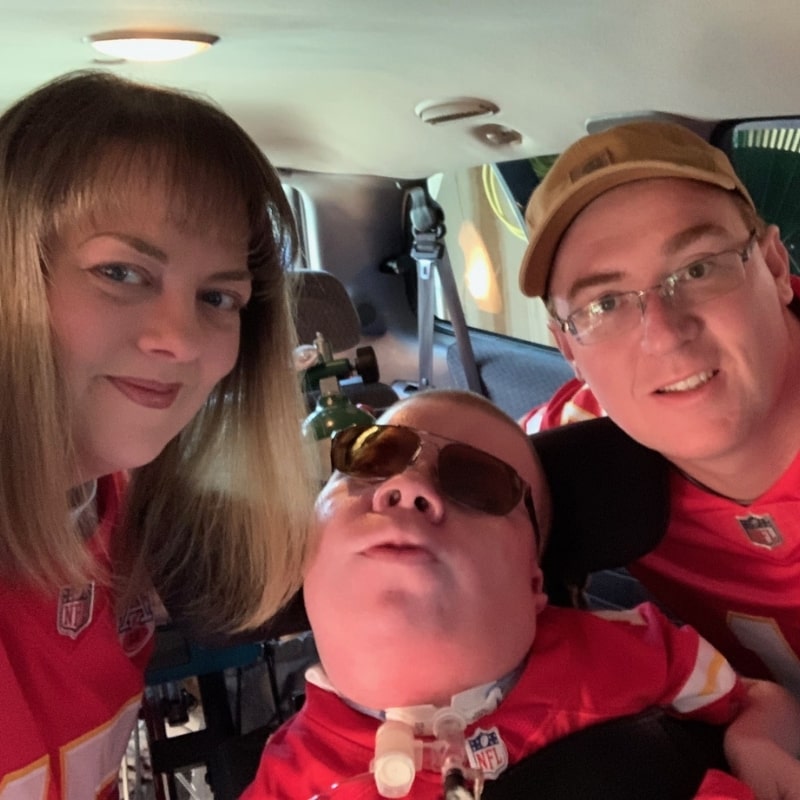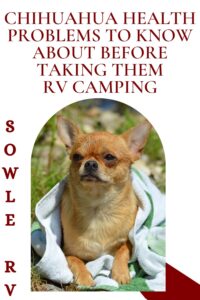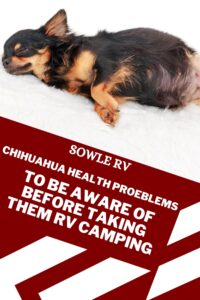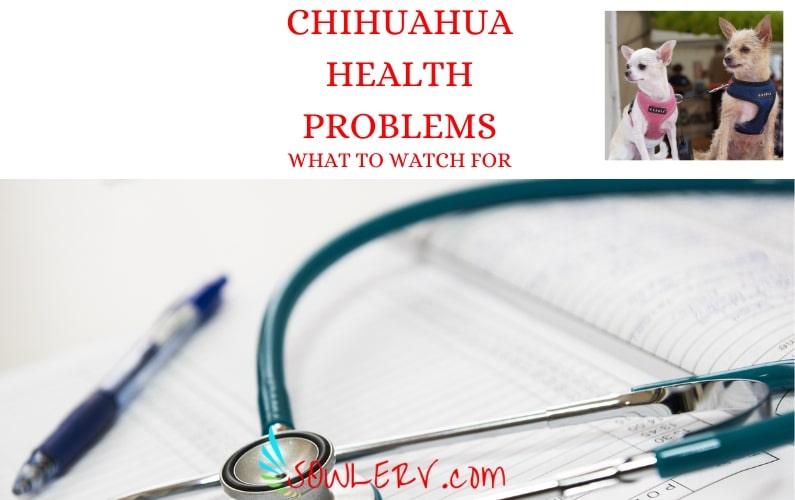
Written by SOWLE RV
November 16, 2018
Chihuahua Health Problems You Need to Know About Before Taking them RV Camping
Whether you are a seasoned Chihuahua Pet Owner or a Newbie to the Chihuahua World, one thing is for sure, once you have a Chihuahua in your home, you will be hooked! Chihuahuas are one of the most loyal pet a person can have. We have had many Chihuahuas in our family and have loved each and every one of them so much. Currently, we have 6 in our immediate family and a total of 9 in our extended family! We have certainly seen our share of health concerns with our Chihuahuas as well. That’s why I decided to write this article. I want to make sure that you all know the common Chihuahua Health Problems that can occur, not to scare you, only to inform you so you know what to watch for BEFORE taking them RV Camping.

Chihuahua Health Problems
Chihuahua’s can have some pretty serious Health Problems, however, these little ones can also have a very long lifespan! Proper care by their owner and Veterinarian can play a large role in helping these pups thrive.
One of the biggest issues we have had is with our Chihuahua’s teeth. Oh, how their breath can get stinky! Let’s start with Chihuahua’s teeth…
Chihuahua Teeth
By the age of 8 months, the Chihuahua should have a full mouth of teeth totaling 42 teeth in all. Our newest puppy has all 42 teeth I assure you and he uses them all to chew on me mostly! HAHA! A Chihuahua puppy will start to lose his/her puppy teeth at 3 months of age; these are their incisor teeth. At four months, the puppy will start to grow its adult pre-molars and adult canine teeth.

Dental Care for the Chihuahua
Dental care is very important for the Chihuahua Breed. Chihuahuas have a very small jaw size which means they tend to have weaker teeth. This can lead to tooth decay and dental disease. That is why it is important to brush your Chihuahua’s teeth daily (or at the very least every 3 days) as a puppy to get them acclimated to the routine.
We didn’t do this at first and regretted it because now it’s even harder to get them to sit still long enough to do it, so try to start early!
There are many puppy toothbrushes and tubes of toothpaste that are safe to use with Chihuahua puppies. Our choice is Sentry Petrodex Enzymatic Toothpaste in Poultry Flavor with the H&H Pets Professional Dog Finger Toothbrush.
How to Brush Your Chihuahuas Teeth and Gums
To brush your Chihuahua’s teeth, it’s important to start at the line where the gum and teeth meet and gently brush in an oval direction.
Professional Dental Cleaning
The Chihuahua should have a professional veterinary dental cleaning performed at 2 years of age if no problems arise prior to that age.

Molera
Many Chihuahuas have a Molera (a soft spot on the skulls). It is located on the top of the head and can vary in shape and size, but typically around 1/4” to 1” across. This isn’t a defect, it’s very normal. It is mostly found in apple head chihuahuas. Most of the time it fills in with age (usually a few months old) but sometimes it doesn’t completely and needs to be paid close attention to their entire life to prevent injury.
Hydrocephalus
There is a lot of confusion between a Chihuahua having a Molera and the chances of he/she also having Hydrocephalus. In many breeds, if a dog has a Molera there is a concern for Hydrocephalus but as stated above, the Molera is not considered a defect but very common in Chihuahuas. Therefore, the concern for Hydrocephalus is not directly related to a Chihuahua having a Molera.
Here are some signs to look for and if you suspect Hydrocephalus:
Bulging Eyes (because cerebral spinal fluid is building up in the brain causing swelling), Behavioral Changes, Delayed Motor Control, Confusion, Sleepiness, Aggression, Altered Gait, and Circling. Also, Vision and Hearing can be affected too. Hydrocephalus can be present at birth or can occur later in life. If you are concerned about your Chihuahua having Hydrocephalus, please contact your Veterinarian immediately.
Hypoglycemia
Chihuahua puppies tend to be at a higher risk for Hypoglycemia (low blood sugar), the same Hypoglycemia as humans can have.
Symptoms of Hypoglycemia in Chihuahua Puppies include the following:
Lethargy, uncoordinated walking, trouble focusing eyes, spasms in the neck, pulling the head back and to one side, fainting, and seizures.
Chihuahua Seizure Disorder
We currently have 2 Chihuahuas that have a seizure disorder. Thankfully it’s not to bad for either of them and they do not require medication at this time. While Chihuahuas are prone to epilepsy because of hypoglycemia, it’s not necessarily the cause of seizures.
Sometimes it’s hard to tell if that’s what is even happening, believe me, we know this ourselves from experience. We have a child who has a seizure disorder and while we can identify his very easily, yet we still struggle with our Chihuahuas because they can look very different from a human seizure. It’s not always as simple as the dog just shaking like a grand mal seizure would appear. That’s why it’s important to find a good Veterinarian to help guide you and your pet if you suspect your Chihuahua is having seizures.
Chihuahuas Heart Disease
Chihuahuas are prone to heart disease that are genetic disorders such as Patent Ductus Arteriosus, Mitral Valve Disease, and Congestive Heart Failure. There are many causes of Congestive Heart Failure in any dog breed. Signs of a possible Heart-related problem and a needed trip to your Veterinarian can include the following:
Coughing for more than 3 days
Shortness of breath or labored breathing
Changes in behavior (more tired, less playful, withdrawn, depressed, boy as affectionate)
Loss of appetite
Weight loss or gain
Fainting
Weakness
Restless
Edema (swollen belly and or extremities)
Isolation
Chihuahua Eyes
Chihuahua eyes are larger and they are more prone to eye infections, eye injury, watery eyes, dry eyes, and eye allergies. Using eye drops can help. Talk with your Veterinarian for the best eye drops for your Chihuahua.
Luxating Patella
Chihuahuas are very well known to inherit luxating patella. Basically, this is when their kneecap becomes dislocated. It is a genetic condition where the ridges that form the patellar groove are not shaped correctly, creating a shallow groove and causing the patella to slip out of place sideways. When this happens, the Chihuahua will bend his/her leg and hold their foot off the ground until the muscle relaxes. As soon as the muscle relaxes they are fine to continue with their regular activity.
Separation Anxiety
Chihuahuas are extremely loyal to their owners. Because of this, it is very common for Chihuahuas to experience Separation Anxiety. Signs that your Chihuahua may be experiencing Separation Anxiety are pacing, excessive salivating, destructive chewing, howling, barking, aggressiveness towards others, and/or whining. Exercise, no-fuss leaving, feeding the Chihuahua before leaving, and turning a tv or music on while away are some ways to help. If the behavior doesn’t improve, a visit to your Veterinarian is the next step.

“WHY DOES YOUR CHIHUAHUA SHAKE?”
If you’re a Chihuahua owner, you know this question to be the number one question everyone asks about your pet. Chihuahuas tend to shiver, shake and tremble when stressed, excited, and or cold. They are less tolerant of cold weather and usually need a sweater for the colder months. They also shouldn’t be outside too long in winter months because it is harder for them to keep warm.
Healthy Diet
The most important thing we can stress is a proper diet for your Chihuahua starting as a puppy and continuing into adulthood. Obesity in Chihuahuas can lead to many health problems such as heart disease, hypoglycemia, diabetes, joint issues, arthritis, and it can certainly lower the overall life expectancy for your Chihuahua. Maintaining an appropriate diet and feeding schedule is crucial for keeping your Chihuahua healthy.
General Health
Most Chihuahuas are healthy and live very long lives; some even to 20 years or more! Proper hygiene, exercise, and care will help to keep them healthy and live long lives.
Enjoy your cuddle bugs! We sure do enjoy ours! We would love to see photos of your Chihuahuas! Please feel free to share below in the comments section!
Conclusion of Chihuahua Health Problems You Need to Know About Before Taking them RV Camping
That’s it for Chihuahua Health Problems You Need to know about before taking them RV Camping. If your Chihuahua is displaying any symptoms listed in this article or any other symptoms, please have them examined by a Professional Veterinarian. This article is for basic Health Information only.
RV Camping: RV Camping with Dogs Articles you don’t want to miss on SOWLERV.com!
How to go RV Camping with Dogs and Must Haves
How To Safely Leave Your Pet in an RV Alone
12 Chihuahua Facts You Need to Know Before Taking them RV Camping
Chihuahua Health Problems You Need to Know About Before Taking them RV Camping
Related Articles
RV Camping with a New Puppy-What You Need to Know
RV Camping with a New Puppy-What You Need to Know There are so many horror stories we have heard of things that have happened to pet owners who take their dogs RV camping for the first time. Believe me, we get it! We currently have 6 chihuahuas ranging from 2 years to...
Top 15 Funny Quotes About RV Camping with Dogs
Top 15 Funny Quotes About RV Camping with Dogs RV Camping with dogs is a blast! We know, we go RV Camping with the SOWLE RV Chihuahua 6-Pack! Over our many years of camping, we have heard numerous Sayings and Quotes About Camping with dogs. Here are our Top 15 Funny...
How To Safely Leave Your Pet in an RV Alone
How To Safely Leave Your Pet in an RV Alone (For A Short Time) We see these questions asked all the time on Social Media… “How do we keep our pets safe while RV Camping”? “Is it safe to leave our pets in an RV alone”? “What if the power goes out while we...







